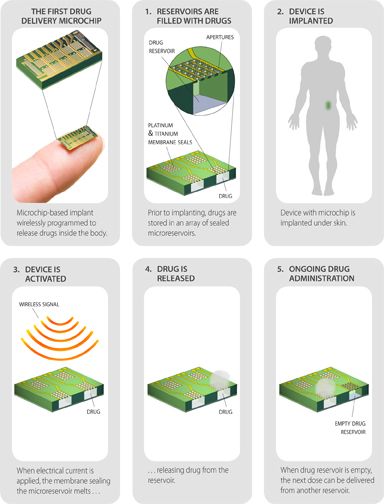Turn Your Birth Control On and Off With a Remote
Bill Gates is backing MicroCHIPS, a Massachusetts-based startup developing an implantable chip that releases birth control hormones on demand
/https://tf-cmsv2-smithsonianmag-media.s3.amazonaws.com/filer/78/d3/78d3baa5-d0d8-406d-bd23-14dfd2a1c38b/rcb_chip_flip_915x470.jpeg)
Bill Gates spends a lot of time thinking about the developing world. The Bill and Melinda Gates Foundation is delivering vaccines, teaching sustainable farming practices and granting women and girls access to contraceptives, so that they can plan if and when they have children. The world’s richest man has already put up more than $1 million to design a better condom in the hopes that more men will use one, and now he’s looking to give women birth control at the flip of a switch.
Gates is backing a company called MicroCHIPS, a startup formed by MIT researchers that’s developed a tiny drug delivery chip. The device is implanted under the skin and contains a reservoir of medication that’s released over a long period of time—years in fact. For people with chronic conditions, the implications are huge. One outpatient procedure could replace a decade or more of regular, painful injections. But unlike existing implantable drug technologies, doctors can communicate with this chip wirelessly to collect patient data and fine-tune dosages.
The device has already been tested in humans to treat osteoporosis, and a version to treat multiple sclerosis is in the pipeline.

What got Gates’ attention is the idea of using the microchip as a contraceptive—one that could last for up to 16 years, and be switched on or off without a trip to the doctor. And while there is certainly a market for such a device here in the United States, Gates is targeting the developing world.
Among the many goals of the Bill and Melinda Gates Foundation is to provide access to voluntary family planning to an additional 120 million women and girls in the poorest countries by 2020. According to the foundation, enabling women to make informed decisions about whether and when to have children reduces unintended pregnancies as well as maternal and newborn deaths. It also increases educational and economic opportunities for women.
The chip is not without its detractors, of course. Some civil libertarians fear it opens the door to a dystopian future where evil governments or corporations seize control of women’s fertility for nefarious purposes—something along the lines of Brave New World meets Lifetime’s The Lottery. And security is a legitimate concern. The FDA warned last year that all medical device makers could be vulnerable to hackers unless they step up their cyber-security game.
To combat those fears, the MicroCHIPS device employs secure encryption and a remote control that needs to come in physical contact with the skin to prevent activation or deactivation without a woman’s knowledge.
The microchip is expected to enter clinical trials within the next two years and could be commercially available as early as 2018. And when the device does become available, the Gates Foundation will be one step closer to its long-term goal of providing universal access to voluntary family planning—which it regards as “one of the most cost-effective investments a country can make in its future.”
This article was originally published by the editorial team at XPRIZE, which designs and operates incentivized competitions to bring about radical breakthroughs for the benefit of humanity.